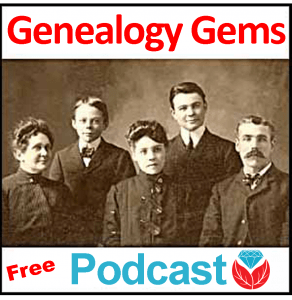Blog

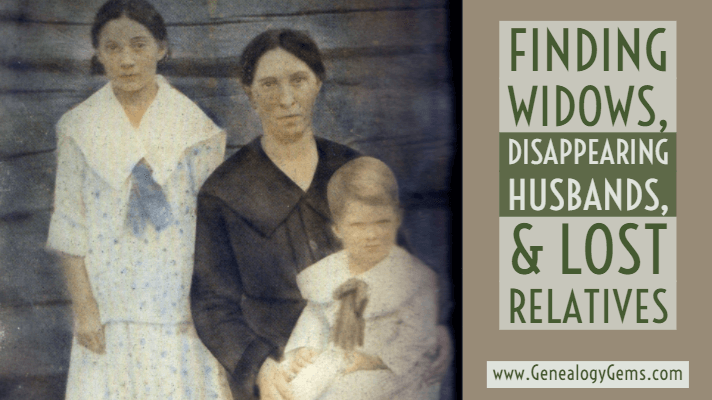
Finding Widows, Disappearing Husbands, and Lost Relatives
Great-grandma may be listed as a widow in the 1900 federal census…but she might not actually be a widow after all. Women in the past sometimes claimed widowhood to protect their family’s good name. A recent reader’s question prompted this post for sharing some tips to finding widows, disappearing husbands, and lost relatives.
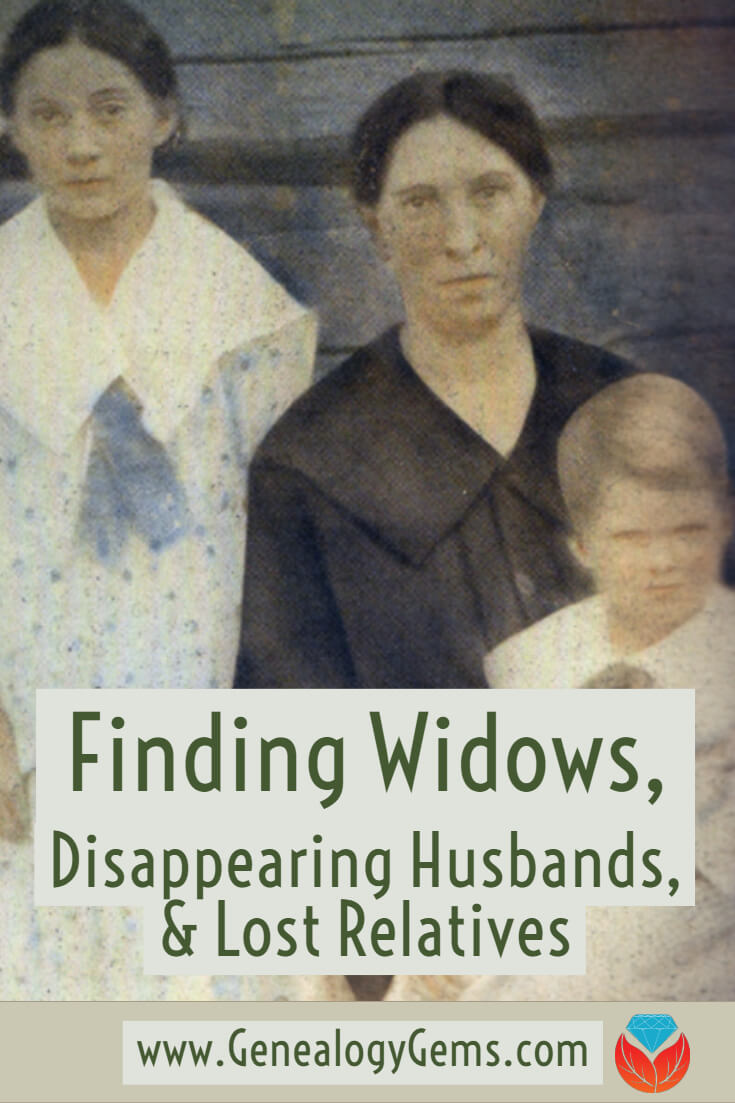
Widow or Not?
Genealogy Gems reader, Mary, wrote us the following comment:
“My grandmother Kitty’s first husband was Robert Lee Jeffries. They married in 1887 and had 4 or 5 children. He died in the very early 1900’s. She later remarried my grandfather, John, and they had four children together. All this took place in Hardin County, Kentucky. I cannot find when, where, or how her first husband died, or where he is buried. Can you help me?”
I think we can give Mary some tips to help her find Robert. As you read along, consider how these same tips and techniques could help you in finding widows, disappearing husbands, and lost relatives.
Finding Death Records in the Early 1900s
A death record is typically a good way to determine where someone went. If you can locate a death record for your lost individual, they aren’t lost anymore! Finding death records for the time period that Mary is asking about isn’t usually too difficult, unless there has been a record loss for that county. By doing a quick check on FamilySearch wiki for Hardin County, Kentucky, I learned that many records between 1852 and 1911 are missing, including some of the death records. That may be why Mary wasn’t able to find one.
When a death record can’t be found, there are many alternatives that we can exhaust. Cemetery records, newspaper obituaries, and probate records are just a few suggestions. But before we move into alternative records, something caught my attention.
Misspelled Names
With a last name like “Jeffries,” there could be several ways to spell it. Jeffrys, Jefferies, Jeffres, and perhaps many more. What can you do when you have a name, first or last, that could be spelled so many different ways?
One suggestion is to search by each of the possible name spellings, but another tool is to use an asterisk or wildcard. The first part of the surname Jeffries is always the same: J e f f. Whether you are searching records at Ancestry, Findmypast, or MyHeritage, you can use an asterisk after the last “f” to indicate you are looking for any of the possible surname spellings.
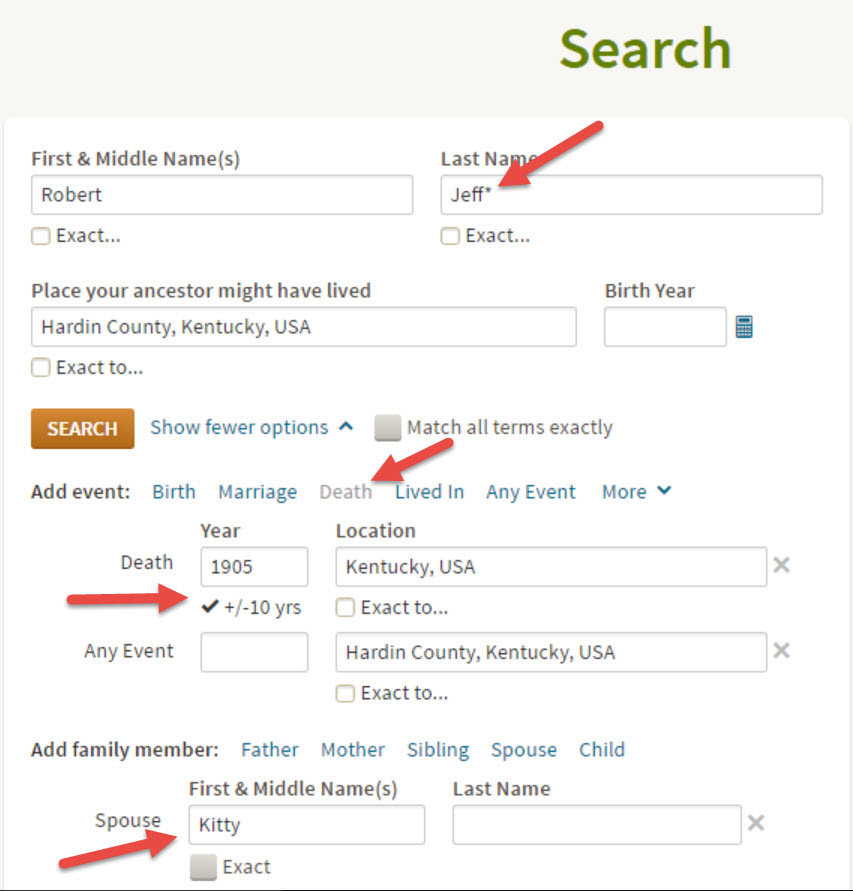
I didn’t find any great matches using the criteria you see in the image above, but I took off the death date range and Kitty’s name and found Bob Lee JeffERies living in his parents home in 1880 in Hardin County, Kentucky. Take a close look at this image:

Do you see the mistake? If you look at the digital image of the census, it spells the surname as Jeffries, however the record is indexed as Jefferies. Not to mention that Robert Lee is recorded as Bob Lee. This combination of name differences will always cause a little hiccup in our search process. This is why it is so important to consider name spellings when searching for records.
Even though using an asterisk didn’t produce a death record, you can see how using a tip like this can help when searching for any records online.
Alternatives to Death Records
Like I mentioned before, Hardin county had some record losses. Just because their death records may have been lost or destroyed, doesn’t mean the probate records were.
Using FamilySearch.org, I used the browse option to search probate record books in Hardin county, Kentucky. I found a record dated 25 Apr 1893, in which Kitty wrote her own will. [1] She mentions Lucy (possibly Robert’s mother found in the 1880 census) and others by name. What is strange is there’s no mention of a husband. I wondered if perhaps husband Robert had died before 1893. Unfortunately, there was no Robert Jeffries (or any variation) in the previous record books and the record book that Kitty appeared in was the last one available online.
When no will can be found, that doesn’t mean there is not a probate record available. The next step would be to visit the Hardin County probate office or State Archives to see if there is an estate packet available for Robert.
An estate packet is typically filled with all sorts of genealogy goodies! Receipts, list of heirs, and affidavits may shed light on many a burning question for your targeted ancestor.
The Disappearing Husband
Sadly, not all husband’s leave their families due to their demise. In the past, it was sometimes easier and more appealing to call yourself a widow or widower when your spouse left you. Kitty wrote a will in 1893 and did not mention a husband. In 1900, she was living in her father’s house and her children were divided up among the relatives, including her in-laws. Could Robert have left Kitty and the children? There may only be one way to know for sure.
Kitty remarried. To do that, either Robert had to die or she would need to be divorced. Divorce records can sometimes be located on a county level or at a state archives. I gave Hardin County Clerk of Courts a call and found out that divorce records between the years of 1804 -1995 are held at the Kentucky Department of Libraries and Archives. Their website provided details to ordering several types of records, including divorce records.
Looking in All the Wrong Places
Sometimes, we are so focused on one area that we can’t see past the end of our noses! Many of our ancestors lived on the borders of other counties. Hardin County, Kentucky is especially unique. It borders not only eight other Kentucky counties, but it also borders Harrison County, Indiana. It’s always a good idea to branch out to these nearby locations when you are having trouble locating records.
A Re-cap
When struggling to find a record for any targeted ancestor, try the following:
- Consider alternate name spellings and search for common nicknames.
- When there has been a possible record loss, search for alternative records that may hold the information you are looking for.
- Determine which counties/states your targeted location is bordering and search there for records as well.
Have you found a disappearing person or long, lost relative? If so, share with us (in the comment section below) your story and how you finally tracked the elusive person down. Maybe your story will help others still searching for that missing ancestor!
More Gems on Finding Missing Ancestors
How to Search Your Ancestors’ Other Spouses and Children
6 Sources that May Name Your Ancestors’ Parents
How to Save Time and Find the Ancestors You Are Looking For
Article References
(1) “Kentucky, Probate Records, 1727-1990,” digital images online, FamilySearch (www.familysearch.org : accessed 10 Aug 2016); record for Kitty A. Jeffries, 1893; citing Will Records, Index, 1893-1915, Vol. G, page 12.
Looking for a Living Relative?
Join Lisa Louise Cooke of The Genealogy Gems Podcast as she reveals 9 strategies to find your living relatives. Unleash your inner private eye and discover the tools that will help you connect with long lost cousins who may just hold the key to your genealogy brick wall!
This video class is part of Genealogy Gems Premium eLearning and includes a downloadable handout. Members can click here to watch right now. (Not a member? Click here to sign up!)
Disclosure: This article contains affiliate links and Genealogy Gems will be compensated if you make a purchase after clicking on these links (at no additional cost to you). Thank you for supporting Genealogy Gems!
This article was originally posted on August 24, 2016 and updated on April 18, 2019.
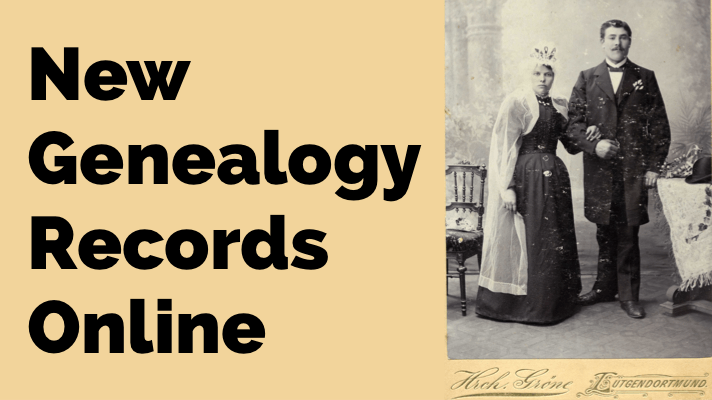
New German Genealogy Records Online & More
It’s a great week for new genealogy records online! We’re featuring German vital records now available at Ancestry.com, including civil registers, parish records, and census records. You can also explore two updated Italian records collections at FamilySearch, plus check out an expert interview for tips on researching your Italian ancestors. Lastly, Findmypast is continuing to to expand their international records with a new Jamaican records collection. Happy researching!
Featured: German Genealogy Records
Ancestry.com, one of the Genealogy Giants subscription websites, has several new German vital records collections now available online. Specifically, Trier, Germany.
You can find a wealth of genealogical information in these civil registers, parish records, and census records. Look for names, dates, locations, parents and spouse names, occupations, and even some narrative comments in margins.
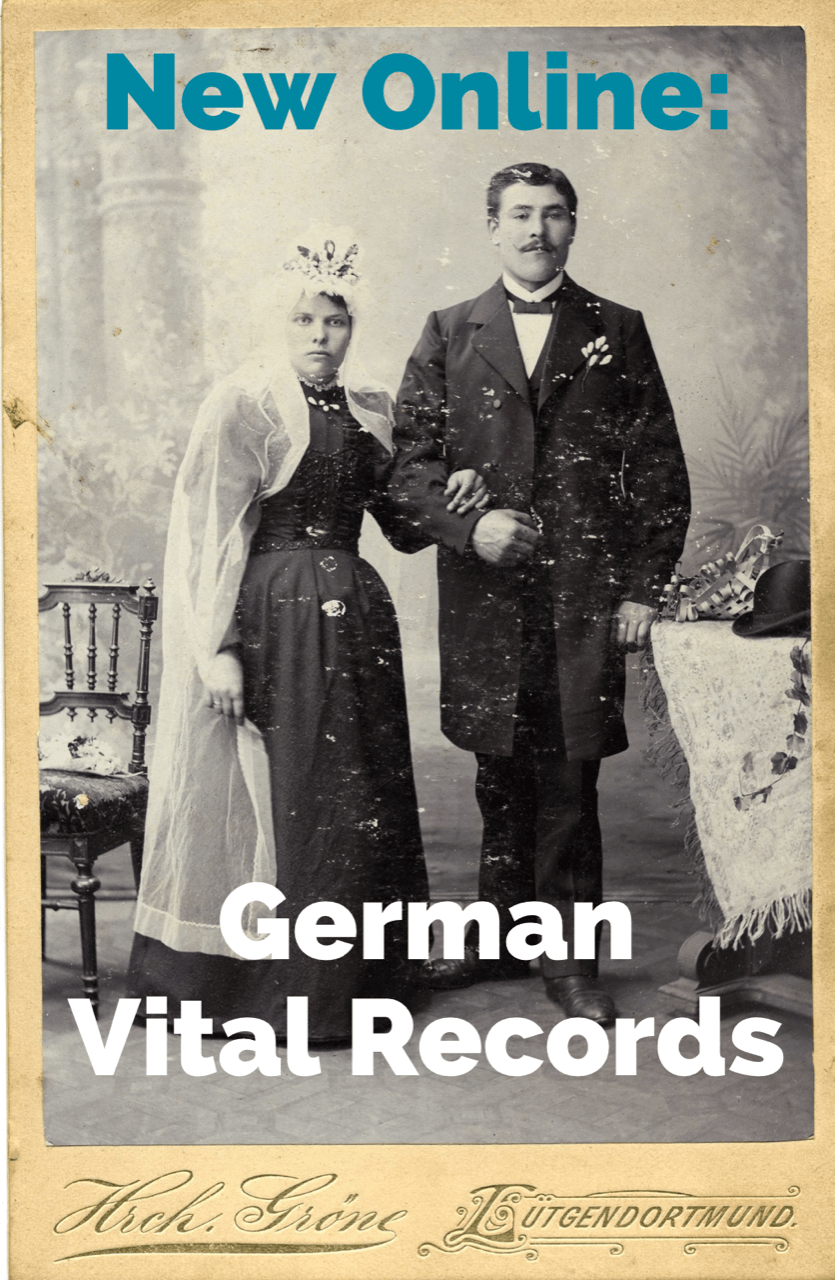
The city of Trier has an interesting history, and is among the oldest cities in Germany. It was founded by the Celts in the late-4th century BC and was known as Treuorum. Later on the city was conquered by the Romans in the late-1st century BC and renamed Trevorum or Augusta Treverorum.
In the Middle Ages, the Archbishop-Elector of Trier was an important prince of the church, and Trier is the oldest seat of a bishop north of the Alps. The archbishop-electorate controlled land from the French border to the Rhine. The Archbishop-Elector also had great significance as one of the seven electors of the Holy Roman Empire. You can learn more about Trier and more available genealogy records at the FamilySearch wiki page for the city here.
Additionally, there is a new collection for Barnim, Germany, Deaths, 1874-1966. The name directories are arranged alphabetically according to the last name of the deceased. They are bound as separate volumes covering several years each. They contain the following details: sequential number, last names and given names of the deceased, residence, and cross reference to death register.
Updated Italian Genealogy Records at FamilySearch
Over at the all-free website FamilySearch, two Italian genealogy records collections have been updated.
- Italy, Napoli, Civil Registration (State Archive), 1809-1865
- Italy, Trento, Diocesi di Trento, Catholic Church Records, 1548-1937
If you’re searching for Italian ancestors, check out episode #207 of The Genealogy Gems Podcast! In this episode, you’ll hear from Mary Tedesco, a co-host of PBS’ Genealogy Roadshow. Mary shares stories and tips about tracing Italian and Italian-American roots.
New Jamaican Genealogy Records Online
Lastly, we head to Findmypast for an exciting new addition to their database. While Findmypast focuses on British and Irish records, they are rapidly expanding their international collections as well!
The latest in this expansion is a big boost of genealogical records for Jamaica. The update includes five new sets encompassing over 2.4 million parish and civil register entries for births, baptisms, marriages, deaths and burials dating back to the mid-17th century.
Jamaica is divided into three counties:
- Cornwall
- Middlesex
- Surrey
Within each county are parishes, the fundamental civil administrative unit. Genealogy records in Jamaica are kept at this local level.
At Findmypast you can currently search:
- Jamaica Birth and Baptism Index 1752-1920
- Jamaica, Church of England Parish Baptisms 1664-1880
- Jamaica, Civil Birth Registrations
- Jamaica, Civil Death Registrations
- Jamaica, Civil Marriage Registrations
These collections may help you discover your Caribbean ancestors and add a Jamaican branch to your family tree.
German Genealogy Research Tips From an Expert

Lacey Cooke
Lacey has been working with Genealogy Gems since the company’s inception in 2007. Now, as the full-time manager of Genealogy Gems, she creates the free weekly newsletter, writes blogs, coordinates live events, and collaborates on new product development. No stranger to working with dead people, Lacey holds a degree in Forensic Anthropology, and is passionate about criminal justice and investigative techniques. She is the proud dog mom of Renly the corgi.
Disclosure: This article contains affiliate links and Genealogy Gems will be compensated if you make a purchase after clicking on these links (at no additional cost to you). Thank you for supporting Genealogy Gems!

Family Reunion Ideas: Top 10 Ways to Incorporate Family History
Family reunions are the perfect place to share your family history with others. The trick is to keep things light and fun!

These top 10 family reunion ideas can sprinkle a healthy–and tasty– dose of heritage into your next family gathering.
10 Family Reunion Ideas for Incorporating Family History
1. Family Tree Hopscotch.
This life-sized bean bag toss/hopscotch game quizzes family members on the names of ancestors. It’s aimed at kids, but adults enjoy it, too!
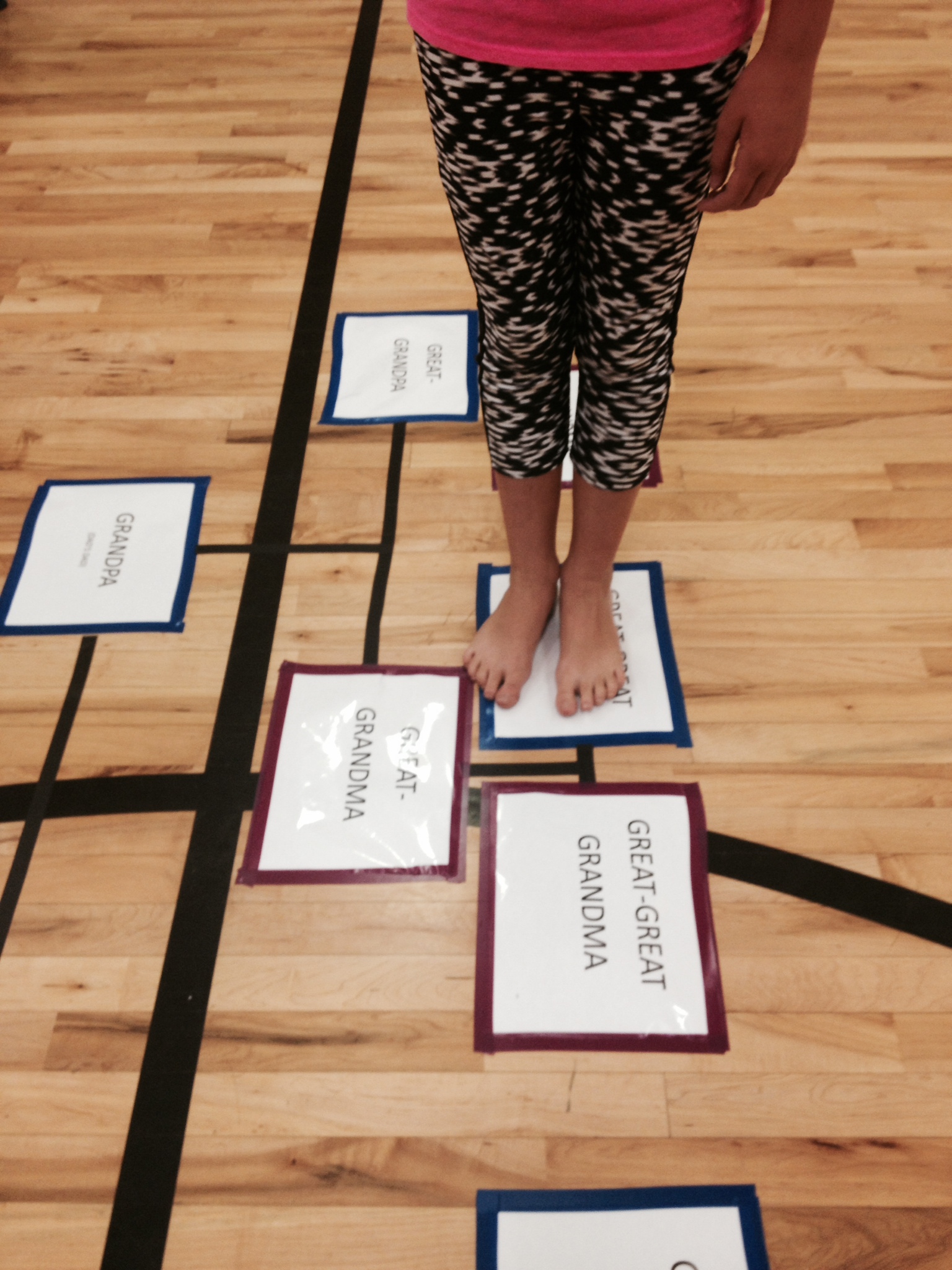
2. Table Talk:
If you’ll be seated at tables, provide an icebreaker that can double as a family history gathering opportunity.
Place a form at each place setting for guests to fill out. (Or a short list of questions for people to answer, if a videographer will make the rounds at each table)
Include questions like:
- What’s your earliest childhood memory?
- Who’s the earliest ancestor you have a photograph of?
- What are three things you remember about great-grandmother?
Can you imagine how this Martha Stewart placecard on Pinterest (which I found by searching “family reunion history” at Pinterest, a great place for collecting family reunion ideas) might be adapted this way?
3. Put Ancestors at the Center of Things:
Centerpieces or displays that celebrate your heritage will attract curious relatives and may prompt memories and comments.
One of our Premium members sent us a description of her conversation-starting centerpiece: click here to read about it.
If guests won’t be seated at tables, set up a family history display table next to the refreshments table (where they’re most likely to walk by!). Let them know that this is their gift to you. You could even have some sort of treat or little sticker they can wear that says, “I shared our family history: Have you?”
4. Sweet Memories:
Create “Sweet Memories Candy Bars” that feature family history. I write about these in my book Genealogy Gems: Ultimate Research Strategies. They are great conversation starters–and the candy is a definite incentive to get people talking.
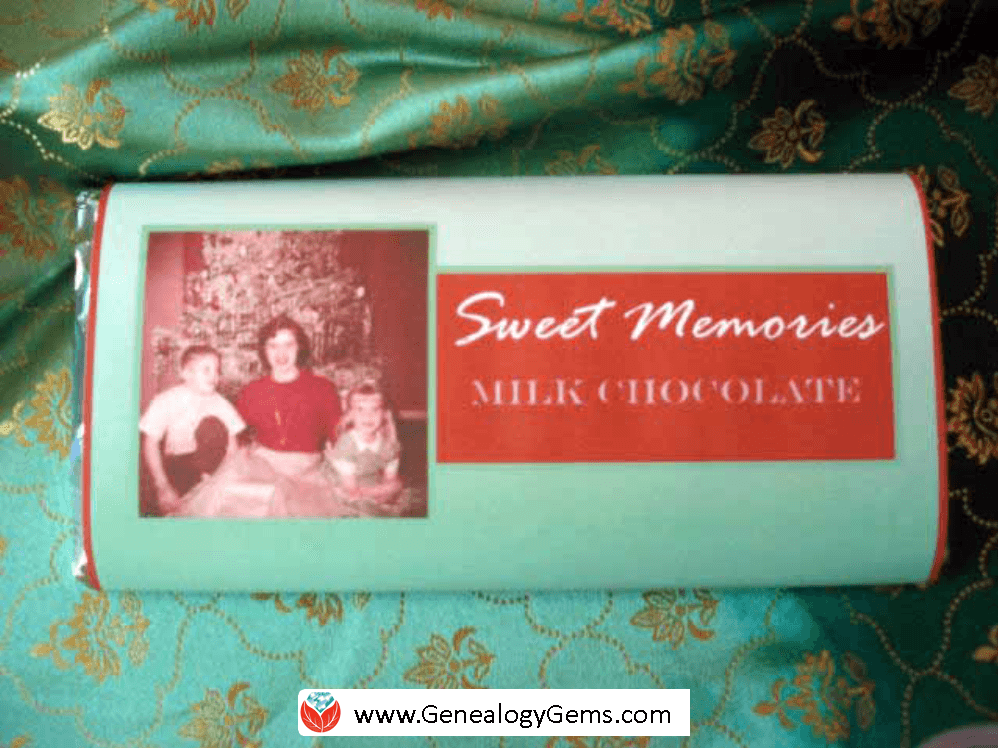
My family adored this customized candy bar
5. Heritage Scrapbook:
A mini, accordion-style scrapbook craft project makes a fun, meaningful activity for all ages. Relatives can work on these alone or in little groups. It’s the kind of project that would be easy to adapt for any family’s background.
6. Have Yourself a Merry Little Family History:
Make a holiday craft that celebrates your heritage. Click here for a free PDF with directions on making a heritage Christmas stocking. Or make a family history-themed wreath, following these instructions I posted on YouTube.
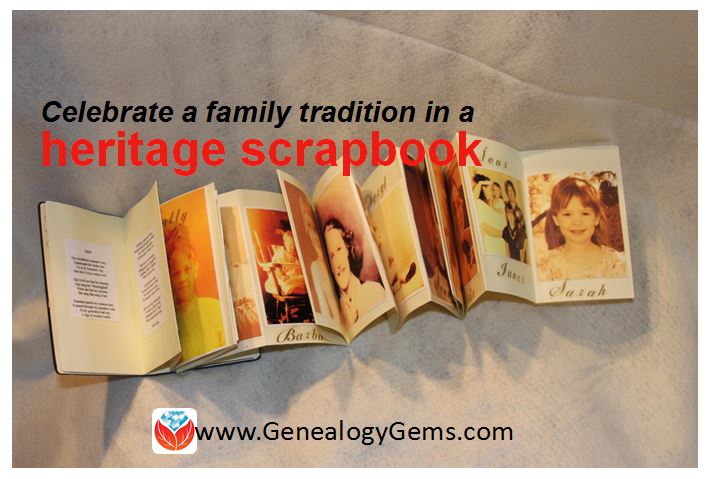
7. Games:
Try a heritage twist on the classic wedding or baby shower games. Create a crossword puzzle or word search with family surnames, hometowns, favorites and more. Here’s a link to one website that creates a puzzle for you for free.
Or invite guests to bring their own baby pictures. Post them for all to see and let your guests guess who each baby is.
8. Cook up some Conversation:
When I was looking for family reunion ideas a while back it occurred to me that my family’s love of food was a great angle to tap into.
Heritage cookbooks are a time-honored way to share family recipes, and they can double as a reunion fund-raiser if you like.
Ask family members to submit recipes. Add recipes from ancestors. Share them with each family or guest who attends.
Remember, it’s not hard to create an e-book of recipes that you can’t share by email or on Facebook. An easy version of this idea: Snapfish offers a really cute way to share individual recipes on pre-printed cards. Only one or two recipes required to make this a success!

9. The Amazing Family History Scavenger Hunt:
Create a list of questions that will require some scavenger-hunt type searching among your relatives.
Questions might include finding someone who has at least 10 grandchildren, was born in California, is about to start kindergarten, likes the Beatles, etc.
Research ahead of time so that questions all apply. This activity gets people talking!
10. DNA Day:
Purchase a few DNA kits for genealogy. Have them on hand in case family members want or are willing to have their DNA swabs done. This is especially great if older relatives are coming, but might not complete the swabs if you mailed them to them.
BONUS FAMILY REUNION TIP:
Did you know you can organize a great family reunion on Facebook–even if not everyone is ON Facebook? Click here to read a post with great tips about using Facebook to keep everyone in the loop and share the good times with those who can’t attend.
Be sure to share this article on family reunion ideas with the family reunion planners you know! It can be so helpful to get a fresh burst of ideas when planning big family gatherings.

